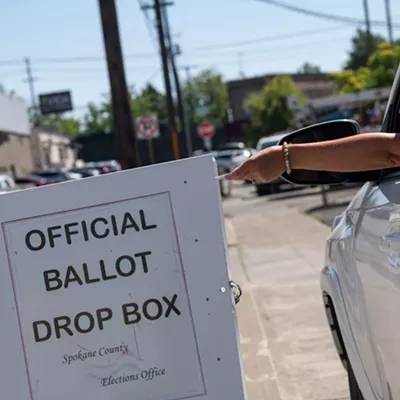Last June, Al Gore was pulled aside for random security screening at the gate at Reagan National Airport. Remarkably, the next day, at Mitchell International in Milwaukee, the same thing happened.
At the time, the obvious joke was that Gore had encountered either the two dumbest airport screeners in the country, or ones so paranoid that they had concluded that because the former vice president had lost the presidential election to George Bush, Gore had gone over to al-Qaida.
Now, however, in the light of something called AVOT, we can revise that joke. Gore might have been pulled out of the boarding lines not because of the risk he posed by having lost to Bush, but rather because of the risk he posed by having questioned him.
AVOT is the most recent acronym selected by the most recent group of Americans who have anointed themselves responsible for deciding what kind of freedoms we should have in this country, and who gets their approval to have them. Where were you when you first heard these great hits of yesteryear: HUAC; McCarthy Committee; Alien and Sedition Acts; Truman Loyalty Oath; Woodrow Wilson Plays "Stop That Newspaper"?
"Americans for Victory Over Terrorism" is the brainchild of the former education secretary and omnipresent scold, William Bennett. Unveiled in March, AVOT signaled its vigilance against threats "both external and internal," and Bennett went on to explain that the internal threats included "ideologues who are attempting to use this opportunity to promulgate their agenda of 'blame America first.' "
In a series of public statements, Bennett identified some of these "internal" threats. There is no evidence that Gore has yet made the list, but the Bennett list definitely includes Rep. Maxine Waters of Southern California, novelist John Edgar Wideman, Harper's magazine Editor Lewis Lapham and former President Jimmy Carter. Their threatening behavior? Each had listened to President Bush's pronouncements about terrorism and not stood up straight enough nor cheered loudly enough.
Most recently, Bennett has swung AVOT against critics of Bush's Gulf War II plans. In a wonderful display of bipartisanship, mentioned in his most recent dispatch from AVOT World Headquarters are Tom Daschle, Dick Durbin and Brent Scowcroft, the national security advisor to the previous President Bush. They presumably join the "internal threats list," while the former Democratic senator Bob Kerrey, whom Bennett cites for having written a Wall Street Journal Op-Ed headlined "Finish the War -- Liberate Iraq," is probably being mailed a gold star he can stick on his forehead.
While Bennett and AVOT basically portray the war of good and evil as a war of right vs. left, it should be remembered that shouting "J'Accuse" in a crowded country has hardly been the exclusive prerogative of conservatives. Harry Truman happily imposed loyalty oaths, and Woodrow Wilson did indeed try to suppress newspapers critical of his war policies. And it is instructive that both editions of the House Un-American Activities Committee flourished under Democratic administrations.
The AVOT story is neither new nor tied to a political party or group. It's the first step of a well-worn path to American hell. The branding, the demonizing, the demand that we always speak with only one voice -- and its inevitable consequences -- should inspire Bennett to make his list, check it twice, and add AVOT to it.
But there is one element of corner-cutting that elevates, or perhaps lowers, AVOT to a different echelon among the would-be silencers of our history. A visitor to its Web site is greeted by the words of two presidents, one set of which has been trimmed to 45 words to make it seem somehow related to the 40 in the other. The shorter excerpt is from George W. Bush's 2002 State of the Union address. The other is a version of FDR's "Four Freedoms":
"We look forward to a world founded on four essential freedoms.
"The first is freedom of speech and expression.
"The second is freedom of every person to worship God in his own way.
"The third is freedom from want.
"The fourth is freedom from fear."
Of course, that wasn't what President Roosevelt said to Congress on Jan. 6, 1941. The actual "Four Freedoms" have a decidedly international meaning, and would seem to argue against both the aims of AVOT and unilateral action against Iraq or anybody else. FDR's words are rarely quoted in full. Perhaps this is an important time to cite them:
"In the future days, which we seek to make secure, we look forward to a world founded upon four essential human freedoms.
"The first is freedom of speech and expression -- everywhere in the world.
"The second is freedom of every person to worship God in his own way -- everywhere in the world.
"The third is freedom from want -- which, translated into world terms, means economic understandings which will secure to every nation a healthy peacetime life for its inhabitants -- everywhere in the world.
"The fourth is freedom from fear -- which, translated into world terms, means a world-wide reduction of armaments to such a point and in such a thorough fashion that no nation will be in a position to commit an act of physical aggression against any neighbor -- anywhere in the world."
Mr. Bennett needs to buy a few ellipses and identify the conveniently edited quote on his Web site as: "Contents May Have Settled During Shipping: Up to But Not Including Four Freedoms."
















